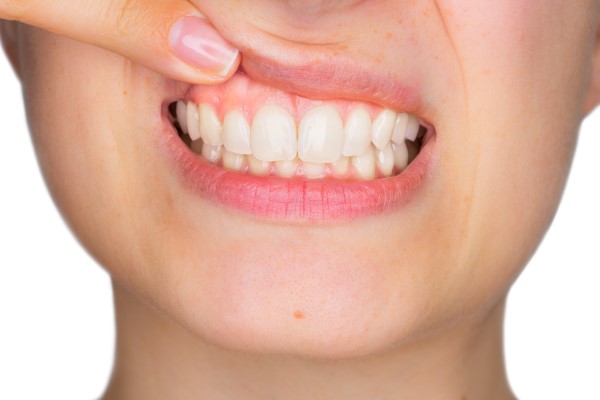Three Tips to Deal With Gum Disease

According to a study conducted by the Centers for Disease Control (CDC), more than 47 percent of adults 30 and older have some form of gum disease. Fortunately, gum disease can be treated and often reversed in most cases. Dealing with gum disease should include improvements in oral hygiene, making smart dietary choices, and regular dental visits.
How to deal with gum disease
Every patient should assess their normal oral care routine and regular diet to determine what steps they can take to improve their periodontal health. The dentist can also examine the patient’s mouth and dental X-rays to make personal recommendations on ways to deal with gum disease long-term.
Good oral hygiene
The number one way to combat gum disease is through good oral hygiene practices. This should include brushing several times a day, flossing regularly, and using mouthwash as the dentist recommends. This helps ensure there is not a build-up of plaque, tartar, food particles, and bacteria along the gum line that could contribute to periodontal disease. Regular cleanings can help reduce the risk of gum disease as well (see below).
Of course, brushing properly is important as well. Be sure to reach all areas of the gums and brush over them thoroughly. However, avoid placing too much pressure upon the gums while brushing. It is also encouraged to check the gums regularly for any signs of gum disease, such as gum discoloration, swollen gums, gum bleeding (especially while brushing), gum pockets, and gum recession.
Smart dietary choices
Gum disease can develop when food particles combine (i.e. sugar) combine with bacteria in the mouth. This creates an acidic reaction that damages the gums and causes gum disease to develop. To reduce this risk, be sure to moderate the consumption of sugar, starch, and other carbohydrates that could contribute to gum disease. Dark beverages such as coffee, tea, and soft drinks can have a similar effect on the gums as well. Another great way to keep the mouth clean and bacteria away from the gums is to sip on water throughout the day.
Regular check-up visits
Good oral hygiene and smart dietary choices are essential for ideal gum health, but they do not replace the role of check-up visits and in-office dental cleanings. Regular visits allow the dentist to detect any early signs of gum disease that may otherwise go unnoticed. Regular cleanings can reduce the risk of gum disease developing, and the dentist can perform more extensive gum disease treatments if necessary, such as a deep dental cleaning, which removes bacteria and cleans below the gum line to treat gum disease.
Schedule a check-up and cleaning today
A check-up visit and cleaning is a great way to determine if and to what severity you may have gum disease, and a cleaning (along with other treatment methods) can help you get your periodontal health where it needs to be. If you would like to arrange a visit for gum disease, then contact our dental practice today.
Request an appointment here: https://hemetdentalcenter.com or call Hemet Dental Center: Brian Stiewel DDS, INC. at (951) 707-4366 for an appointment in our Hemet office.
Check out what others are saying about our dental services on Yelp: Gum Disease in Hemet, CA.
Recent Posts
Periodontal disease, or gum disease, can be incredibly concerning and lead to other, more severe oral health issues if left untreated for an extended amount of time. Consequently, it is important to fully understand the various signs and symptoms of periodontal disease in order to be able to spot periodontal disease as soon as it…
The CDC states that gum disease, also known as periodontal disease, is one of the leading oral infections in the United States. In addition, the National Institute of Health cites it as the most common culprit for adults losing teeth. Because the early stages of periodontal disease often do not have noticeable symptoms, many patients…
Gum disease is one of the most common oral health issues. Many individuals, however, are unaware that they are dealing with the condition. Gum disease is believed to affect millions of adults in the United States, according to the International Journal of Health Sciences. Many people who do not currently have gum disease may develop…
The CDC reports that almost half of adults in the United States have a form of gum disease, also known as periodontitis or periodontal disease. For adults over 65, this number increases to 70%. This rampant disease is largely preventable, yet the subtle signs and symptoms in the early stages leave many patients unaware that…


